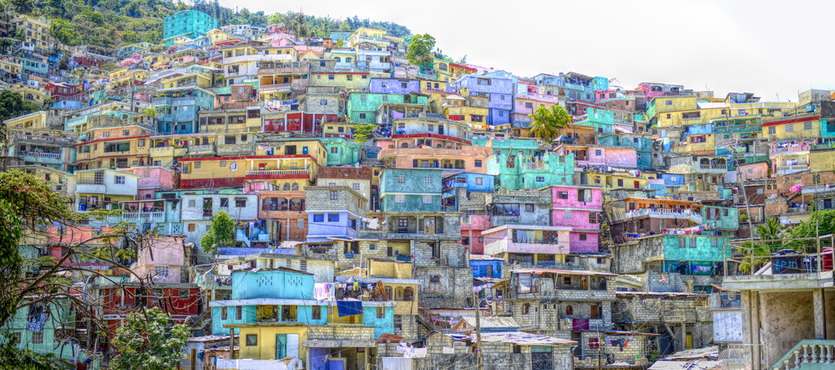Only one member of Haiti’s Provisional Electoral Council remains after a wave of resignations, and no one is sure when the next election will be held.
Prior to the resignations, Léopold Berlanger’s government had been in power for four years without any serious corruption or other issues, an unprecedented tenure for an elected government in this island nation. The last elections, which were held in 2016, were almost a year late. So, the future is quite uncertain.
Officials promise that a forthcoming electoral law will make the situation much clearer.
Haiti’s Troubled History
An aerial view of the island of Hispaniola tells careful observers pretty much all they need to know about Haiti’s history.
The Dominican Republic occupies the eastern two-thirds of Hispaniola. The DR has one of the largest economies in the Caribbean. Its capital, Santo Domingo, has roughly three million residents, making it the largest urban area in the region. The landscape is mostly green. An intricate network of well-maintained roads criss-crosses the country.
The Spanish, who ruled the DR for centuries, invested heavily in this colony. That investment included conserving the island’s natural resources and allowing residents to largely govern themselves.
Even if the boundary is not superimposed, it is easy to tell when the Domincan Republic ends and Haiti begins.
The western one-third of Hispaniola is largely a wasteland. There are very few lush green trees. And, the few Haitian roads are little more than hiking trails.
The French, who ruled Haiti for centuries, took everything they could form the colony. That includes the island’s natural resources as well as its human resources. Colonial Haiti had almost no self-governing capacity.
So, the country was ill-prepared for independence. Things got worse when, shortly after it separated from the mother country, a French fleet sailed to Port-au-Prince and demanded “protection money.” The Haitians scraped up enough to convince the French to leave, but the large, unexpected expenditure put the country further behind the eight-ball.
For most of its history, Haiti has been one of the poorest countries in the Caribbean, and that is saying a lot. Also for much of its history, various military and civilian strongmen have ruled the nation.
The 2010 Earthquake and Contractor Responsibilities
Haiti’s grim situation went from bad to worse in 2010, when a 7.0 earthquake devastated much of the country. For a nation with a stable government and considerable resources, a large earthquake is usually not the end of the world, but Haiti had neither of these things. So, even 10 years later, the nation is still not back on its feet. A significant number of Haitians still live in temporary housing facilities.
International aid poured into the country after the earthquake. Usually, that is a good thing, but in this case, it was like dumping a truckload of food in a starving village and not staying to supervise food distribution. So, Haiti’s traditional great divide between the haves and have-nots got much bigger.
In other words, modern Haiti has significant infrastructure and security concerns. Private military contractors address both of these needs.
As mentioned, Haiti’s infrastructure is almost in shambles. Simply getting from Point A to Point B is quite difficult, especially if the weather is bad.
The first step in getting aid to the people who need it is actually reaching these people. So, contractors supervise construction projects like filling potholes and repairing bridges. These matters may seem trivial, but they could literally be the difference between life and death in some cases.
Projects like these are quite hazardous. Unlike the United States, Haiti has very few workplace safety laws. Workplace accidents, like falls and motor vehicle crashes, are rather common. As outlined below, the Defense Base Act covers injuries like these.
The urban instability breeds insecurity. Americans will not tolerate regular service members on a peacekeeping mission after the disasters of the past. But security contractors work quietly. For the most part, security contractors are not aggressive door-kickers. They know how to handle instability without escalating the situation. They diffuse tense situations, so some sense of normalcy can return.
Injury Compensation Available
Some people think the Defense Base Act only applies to combat contractors and combat injuries. The DBA is the umbrella injury compensation plan for all foreign non-government workers. That includes people like Peace Corps volunteers.
Injured contractors are eligible for benefits if they served in a war zone and sustained a deployment-related injury. In this context, a “war zone” is any country with any U.S. military presence. Furthermore, deployment-related injuries include indirect injuries, such as a contractor who goes swimming and drowns.
The DBA replaces lost wages. Generally, injured victims receive two-thirds of their Average Weekly Wage for the duration of their temporary disabilities. Permanently disabled victims are usually eligible for financial compensation, as well.
The DBA also pays all reasonably necessary medical bills. That includes everything from the ambulance ride to the hospital to the last day of physical therapy. Typically, the DBA insurance company pays these bills directly. Most victims never see a statement, and they are not responsible for any unpaid charges.
To learn more about how the DBA works, contact Barnett, Lerner, Karsen, Frankel & Castro, P.A.

